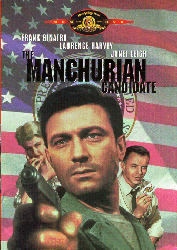

The Manchurian Candidate
Director: John Frankenheimer
by Marc Hirsh
originally published in edited form in the Rice Thresher, September 17, 1993
When The Manchurian Candidate was originally released in 1962, many feared that President John F. Kennedy's efforts to improve relations with the Soviet Union would be jeopardized by what appeared to be a strong anti-Communist plot. Ironically, when Kennedy himself heard that a film was being made of Richard Condon's book of the same name, he notified producer-director John Frankenheimer and producer George Axelrod and expressed his primary concern: who would be playing Raymond Shaw's mother?
Kennedy's assassination complicated matters immensely. The disturbing similarities between the film's pivotal scene and the death of the President were enough to keep the film out of distribution for more than twenty-five years. Finally, though, in 1989, the political and social climates had changed enough for United Artists to release the movie to almost universal acclaim. One of the great lost classics of American cinema had been restored and is now playing at the Media Center.
Like such recent films with plot twists like The Crying Game and Dead Again, Candidate is capable of being enjoyed many times, on many levels. Those who have never seen it can be captivated by the complex plot, while repeat viewers can focus on the development of each character or scour the screen for the patriotic imagery or merely watch as each scene builds perfectly on the last until the entire picture is in full view. Knowing the secret to Candidate is only half of the story. Understanding just how the puzzle fits together is the other half.
The basic plot follows U.S. Army Sgt. Raymond Shaw (Lawrence Harvey), who, as a P.O.W. in the Korean War, is brainwashed by Communists to fulfill a mission in America. His superior, Captain Bennett Marko (Frank Sinatra), is also "conditioned," as the Communists like to say, to recommend the Sergeant for the Congressional Medal of Honor, the highest accolade in the nation, which will make Shaw a hero in the eyes of America and thus untouchable.
Although the entire unit has been brainwashed to have no recollection of their treatment by the Communists, Marko begins having recurring nightmares in which he recalls the conditioning process, and he sets out to learn Shaw's mission and stop it.
Along the way, the plot becomes more complex. Shaw's mother (Angela Lansbury) is a fervent patriot guiding her second husband, Senator John Iselin, through a series of attacks against the Communist threat, real and imagined. Iselin is a weak and feeble-minded individual who identifies himself with Abraham Lincoln but is actually entirely dependent on his wife for direction. Mrs. Iselin controls his actions, while the Senator is merely the mouthpiece, and when he objects at one point, she tells him straight, "I keep telling you not to think." Shaw despises both, although his mother is able to control him as well, albeit with much more effort.
As portrayed wonderfully by the late Lawrence Harvey, Shaw comes across as a loner who revels in solitude because he does not know anything else. This point is underscored by the use of a game of solitaire as a trigger to send Shaw into a state of hypnosis. In doing this, Shaw becomes vulnerable to psychological attack. Indeed, much of the movie focuses on psychology, from the use of brainwashing as a battle technique to the recurring nightmares to the barely-touched-upon Oedipal complex between Shaw and his mother. As Josie Jordan, Shaw's girlfriend and daughter of Senator Thomas Jordan, Iselin's main detractor, says, "I know that sounds very Freudian." It probably is. Marko is only able to get a handle on the situation by analyzing the details from a psychological standpoint.
For a man not known for his acting, Frank Sinatra turns in a very good performance as Marko. Although not as challenging a character as Shaw, Marko must deal with his own demons before he can fully tackle those that control Shaw. Respite comes in the form of Eugenie "Rosie" Chaney (Janet Leigh), whom Marko has met on a train while trying to sort out his own problems. The relationship between Chaney and Marko provides a counterpoint to Shaw's solitude. Chaney is very forward with Marko, and their relationship happens so absurdly fast that there is a hint of menace in it, but Marko doesn't notice because she was exactly what he needed.
The film as a whole is also very well put together. There is a beautiful pan, in which a ladies' garden club becomes a group of Manchurian Communists in a long, slow sweep of the camera. During the same scene, Shaw is often shown with a giant portrait of Joseph Stalin occupying the other half of the screen, a technique used later with Sen. Iselin and Lincoln. The effect creates a nice split-screen effect of domination and submission, intelligence and buffoonery, and, on a larger scale, good and evil.
Thirty years after it was originally released, The Manchurian Candidate still works as both entertainment and satire. Those who haven't seen it are missing out, and those who have can enjoy seeing how the movie changes subtly when the plot twist is no longer a twist. The notion that the far left and the far right can be indistinguishable still holds true today, as does the fear and possibility that the enemy may be among ourselves.